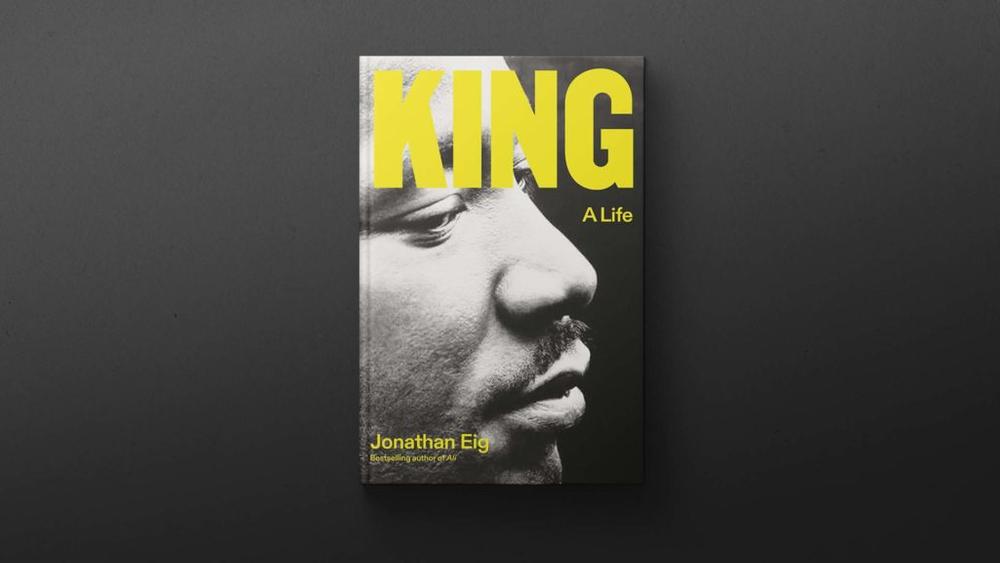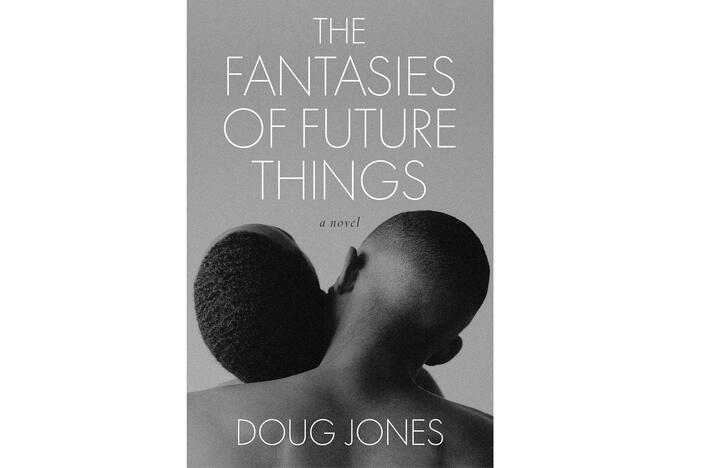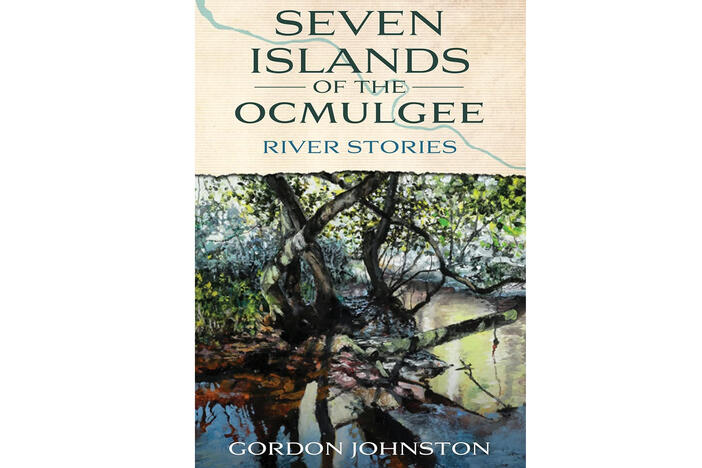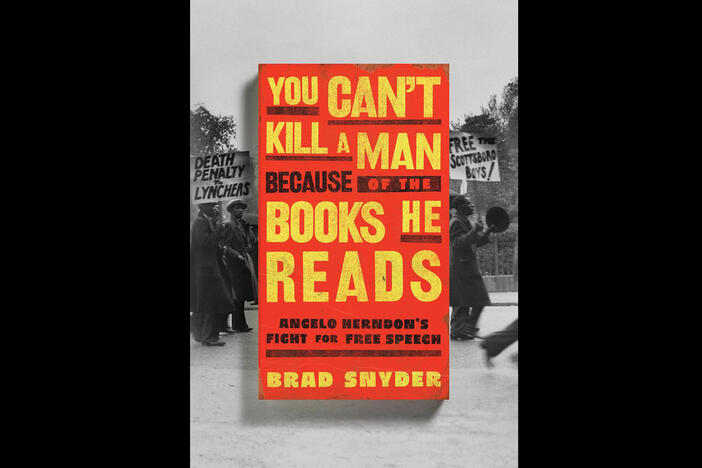
Section Branding
Header Content
Jonathan Eig's King: A Life
Primary Content
"King: A Life" by Jonathan Eig, the first major biography of Dr. Martin Luther King Jr. in decades, is a generational book filled with new information and perspectives from living witnesses, declassified documents, and unheard audio recordings. After a discussion with Jonathan Eig, Peter and Orlando share some of their thoughts and insights on "King: A Life."

Orlando Montoya: Coming up in this episode.
Peter Biello: Parts of the story really lend itself to psychoanalysis in some way. You see how he's been brought up and what formed his thinking early on in his life.
Jonathan Eig: I cannot on the printed page, convey the magic, the power, the majesty of that speech.
Orlando Montoya: When I say "new information," one of the things I'm thinking about is declassified documents.
Peter Biello: This podcast from Georgia Public Broadcasting highlights books with Georgia connections, hosted by two of your favorite public radio book nerds, who also happened to be your hosts of All Things Considered on GPB Radio. I'm Peter Biello.
Orlando Montoya: And I'm Orlando Montoya. Thanks for joining us as we introduce you to authors, their writings and the insights behind their stories, mixed with our own thoughts and ideas on just what gives these works the Narrative Edge.
Peter Biello: All right, Orlando, it's your turn. Your book. What have you got to share with us?
Orlando Montoya: Well, I'm going to take us to the biography section today. We're going to pull off a biography of the Rev. Dr. Martin Luther King Jr. It's called King: A Life by Jonathan Eig. And it's kind of lengthy. It's 669 pages, but it goes really fast because it's got a lot of new information about this legend that we've all known about.
Peter Biello: OK. What new information? Because, I mean, it feels like we've been told various versions of the story of his life over the decades.
Orlando Montoya: Well, you know, just like every generation needs to tell the story of the founders; you think of World War II, how many books come out every decade about that? It's just that our zeitgeist changes. We have not only new information, but a new way of thinking about the information. And so when I say new information, one of the things I'm thinking about is declassified documents. You may know that, you know, over the past decade or so, we've declassified a lot of documents about King, and there have been some headlines come up about these declassified documents.
Peter Biello: OK. So what was in these documents?
Orlando Montoya: Well, one of the headlines that keeps coming up about this book, as in, you know, when when when the reporters go and they say, "what's new about this book?" One of the headlines is that LBJ knew about FBI director J. Edgar Hoover's campaign to undermine King but did nothing to stop it. And here's Eig talking about that. And here Eig is talking about LBJ.
Jonathan Eig: I think he was enjoying the gossip. He enjoyed having power over people. He enjoyed having more information on people, even if they were not necessarily his political rivals. Even if they were people that he allied with and worked with, he still liked having information that he might use to control that relationship. And he and J. Edgar Hoover were good, close friends. And J. Edgar Hoover was clearly out to get Martin Luther King Jr. And LBJ, perhaps more than anyone, had a chance to stop that campaign. Maybe, like a lot of people were, he was — he might have been afraid of taking on J. Edgar Hoover, who had a lot of power in his own right. But I also think that LBJ enjoyed it. I think he enjoyed the gossip. He enjoyed having the inside information about Dr. King's personal life.
Orlando Montoya: So that's just one of the headlines that's coming out of Eig's new book.
Peter Biello: That's not super surprising about LBJ. I mean, he was a powerbroker to the extreme.
Orlando Montoya: We kind of knew that.
Peter Biello: Yeah.
Orlando Montoya: We kind of knew that. But there's more information there. Also just, you know, our — our perceptions of the role of women have changed also. And Eig goes into the book about how, you know, a lot of the women in the civil rights movement were asking, you know, King and others, you know, let us have more let us have more roles. But but did but they did not. So there's a lot about that. So that's what I mean by zeitgeist changing. You know, we're kind of looking about things in a different way.
Peter Biello: Meaning, like previous biographers didn't really pay much attention to the role of women or how —
Orlando Montoya: Yeah.
Peter Biello: — [how] Dr. Martin Luther King included them in the in the in the civil rights movement.
Orlando Montoya: Like we all knew about MLK, his prolific marital infidelity. Yeah. I mean, that's something that we knew about.
Peter Biello: And is this something that Eig talks about in detail?
Orlando Montoya: And he goes about it in more of trying to talk about how Hoover was trying to destroy King, then. You know, we're living in an age where we we like to see our heroes a little bit human, a little bit flawed. I think what Eig would say and what he does say is that by hallowing King we have hollowed him. In other words, by treating him as a god, we have hollowed him in a way. So that's what — that's one of the interesting things about the book.
Peter Biello: Well, you mentioned zeitgeist, and of course, I feel like in the culture right now, the zeitgeist is in favor of flawed heroes. We see them on TV, we see them in movies, people who we're supposed to root for even if they're not perfect. And that seems like what this book is about: someone who is a hero but not perfect.
Orlando Montoya: And we find out why they're flawed. And one — another new information in this book is about Daddy King. So MLK's father King Sr. — Eig found audiotaped interviews for an unpublished biography that Daddy King was going to write but never did. And so these audiotaped interviews provide a lot of details about King's childhood. King was beaten by his father severely, and this led to, well, a lot of problems. I'll have Eig talk about it here.
Jonathan Eig: The relationship between Daddy King and MLK is a fascinating one. It's clear that they love each other, that they pushed each other. But Martin Luther King Jr. always has a little bit of fear of his father and really hates confrontation with his father. It's funny to think about the fact that one of our great activists, one of our great protest leaders, is averse to conflict, and not just with his father, with any father figure, with people like Roy Wilkins of the NAACP. King really shudders; he — he tries at all costs to avoid conflict. And I think that goes back to his difficult relationship with his father. You know, Daddy King spanked the kids with a belt, sometimes in the front yard or the backyard where neighbors could see. And he was very upset when his son began to risk his life in the civil rights movement and wanted him to come home and wanted him to give up the leadership of the Montgomery bus boycott. But Martin Luther King, as hard as it was for him, did stand up to his father in his own way. And, of course, you know, forged his own path.
Orlando Montoya: Eig goes really into this relationship with his father. And not only that, we go back to the grandfather. We go back to Stockbridge, Ga., one generation removed from slavery.
Peter Biello: So it sounds like what you're saying is that parts of the story really lend itself to psychoanalysis in some way. You see how he's been brought up and what formed his thinking early on in his life.
Orlando Montoya: You know, some people, we might call it psychoanalysis, I prefer to call it character development. Back story. How do we get from there to here? And that's another thing that I found very interesting about this book, the way Eig writes it. We don't know what's going to happen. He writes it in a way that kind of leads to some doubt. Is he going to become a minister? Is he going to go to Montgomery? Is he going to go to the Lorraine Motel? We know these things. But when you're writing about someone this well-known, it seems to me very hard to do, to kind of write it in a way that's so compelling, that we don't know it.
Peter Biello: Well, we have to talk about the "I Have a Dream" speech, because we're coming up on the 60th anniversary of that speech, which was on Aug. 28, 1963. What can you tell us about the speech that we don't already know that you learned in this book?
Orlando Montoya: Well, I have two clips for you. One is about the origin of the speech, how it came to be, you know, King we know, wasn't prepared for it mentally. He wrote it the night before when he arrived at the hotel in Washington, D.C. He stayed up late at night working on it. And Eig shared some of that.
Jonathan Eig: When you read the draft that he submitted and he turned it into reporters before the speech so they could have a copy of it and they could get make their deadlines, it's a fairly political document. It's powerful, but it doesn't soar with the kind of rhetoric that we're used to. It's more of a political speech than a than a religious one. And King's sermons were really usually what he was best known for, of course. But as he finished the written portion of the text, he decided he wasn't done yet and he was going to blow past the time limit they had set on him and he was going to extend. And that's when he said, "And today I have a dream."
Orlando Montoya: And that was Mahalia Jackson, who cried out from from behind.
Jonathan Eig: Well, I discovered something a little different. Many people have reported over the years that Mahalia Jackson cried out and inspired him. And then King, hearing Mahalia, decided to go on and to do the I Have a Dream speech, which she had heard him give earlier in Detroit. But that's not true. Actually, what happened was that King decided on his own. And I, I obtained a copy of the master recording that Motown made that day, and you could hear every word out of Mahalia's mouth. What actually happened is that King finished his speech, began I Have a Dream. And then about the second or third time he said, "I have a dream." Mahalia echoed him and said, "Tell 'em about the dream, Martin." And over the time that story has been changed a little bit to give Mahalia credit for inspiring him. But I don't think that's actually what happened.
Orlando Montoya: So did you know that bit about Mahalia Jackson?
Peter Biello: No, I didn't know that.
Orlando Montoya: Yeah. So that that the speech was actually in two parts. There's the boring part that he wrote, the boring political part that he wrote in the hotel the night before. And then this part about "I Have a Dream," which he had been working on for some time, and he had worked on that speech, in part, in Savannah. You know, I'm from Savannah, as I like to say.
Peter Biello: Got to mention Savannah.
Orlando Montoya: So there's a church in Savannah that says we're the church where King practiced his or he had an early version of the I Have a Dream speech.
Peter Biello: It's just just forget about what he said about Detroit.
Orlando Montoya: Yeah, well, no, he also did — he also did it in Detroit as well. But Second African Baptist Church in in Savannah and this church in Detroit where he practiced his speech. And so that's where he goes off script in Washington and says, "I have a dream." And then Mahalia comes in. And the Mahalia story I had heard before through various ministers, usually in the context of speaking extemporaneously and just going extemporaneously. So anyways, all of these things were new to me.
Peter Biello: And you said you had a second clip to play us about that?
Orlando Montoya: Yeah. Something else about the — the speech that I want to highlight is just how Eig wrote about it, you know? So this podcast we're all about the content itself, but also the writerly aspect of it. How are you going to write about a speech that everybody knows? We've already done so much research about this speech. And so Big — what Eig chose to do was sort of take us away from the speech to talk about the speech.
Jonathan Eig: Well, there's a problem with this storytelling that I encountered. How am I going to write about the I Have a Dream speech in a way that feels as powerful as the dream speech itself? I can't. I cannot, on the printed page, convey the magic, the power, the majesty of that speech. So I had to do something different. I had to think about being creative. And I decided to take the lens off of Dr. King and show how that speech echoed with the people in the crowd. So I wove in three stories, really: the story of Dr. King and the words in this speech he's giving, along with the story of a teenage girl from Chicago, Francine Washington, who just at the last minute got on a train with a bottle of Coke and a change of underwear in her backpack and decided that she was going to come there because she was inspired by what she saw King doing. She's a Black girl and she wanted to believe that King could actually change her life. The other, third person I wove in is the white bodyguard who's standing next to King as he gives a speech. If you look in the photos, you'll see there's this tall guy in a park ranger hat. His name is Gunny Gundrum. And I thought, "Who's that guy? Why is he in every photo of King giving his speech?" And at one point, if you watch the video, Gunny reaches in and adjusts the microphone in the middle of the speech. Who has got the nerve to stick his arm in front of Dr. King when he's giving the greatest speech of his life? But Gunny did. So I tracked him down to and talked about what it was like for a white man who had never met a Black person until he went in the Army. What was it like for him? How did that speech change his life? So I wove those three stories into the chapter.
Orlando Montoya: Isn't that an innovative way of talking about a speech that we all know?
Peter Biello: Absolutely. That's amazing.
Orlando Montoya: So there's all these different ways that he writes that I wanted to call up as well.
Peter Biello: So I wonder if we get the sense that Eig knows he's writing a generational book? How does Eig see his own work here?
Orlando Montoya: I think that Eig thinks, definitely sees his work as definitive. I mean, it is the first major biography of King in decades. We have to go back to the 1980s, and I think there was a few in the early 2000s as well. But this is the book about King for our time. So it's definitely a definitive book. He has written previous, definitive books of Lou Gehrig, Jackie Robinson, Al Capone, Muhammad Ali. And this is also, Eig believes, going to be the last major biography featuring the words of living witnesses, people who knew him. I mean, you and I reported a few months ago about the death of Christine King Farris, King's older sister, in June, and then Harry Belafonte died in May. So in the end, that's why Eig says he wanted to write this book.
Jonathan Eig: When I was interviewing people for my Muhammad Ali book, people like Dick Gregory and Harry Belafonte and Jesse Jackson, it occurred to me that they knew Dr. King as well. And I asked them about how the two men got along. What did Ali think of Dr. King? What did Dr. King think of Ali? And then I just began asking them questions, really, out of curiosity. What was Dr. King like? What was it like to be around him? And that was when I realized that there was this great opportunity to interview people who knew him. And that the window was closing. So I just felt like history needs to take advantage of the fact that we still have these living witnesses.
Orlando Montoya: So there's another thing that gives this book the Narrative Edge.
Peter Biello: I feel like those are the reasons I want to pick up this book, right? I'm always fascinated by him, of course, as a historical figure, but hearing about what it's like to be around him. I mean, I feel like I haven't encountered that in a book yet. It's fascinating.
Orlando Montoya: Get it from somebody who was there with him instead of, you know, you know, figures that have passed on. We — we're not going to have that first person account anymore. So living witnesses, new information, a forward-moving text of one of the greatest Americans who ever lived, the greatest Georgians — that's some of the reasons why I give this book the Narrative Edge.
Peter Biello: Fantastic. Well, Orlando, thanks so much for sharing this information about King: A Life. Jonathan Eig.
Orlando Montoya: All right. And you'll have something for me next time.
Peter Biello: I'm coming right up. Thanks for listening to Narrative Edge. We'll be back in two weeks with a brand-new episode. This podcast is a production of Georgia Public Broadcasting. Find us online at GPB.org/NarrativeEdge.
Orlando Montoya: You also can catch us on the daily GPB News podcast Georgia Today for a concise update on the latest news in Georgia. For more on that and for all of our podcasts, go to GPB.org/podcasts.
King: A Life by Jonathan Eig, the first major biography of Dr. Martin Luther King Jr. in decades, is a generational book filled with new information and perspectives from living witnesses, declassified documents, and unheard audio recordings. After a discussion with Jonathan Eig, Peter and Orlando share some of their thoughts and insights on King: A Life.







